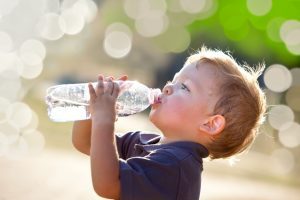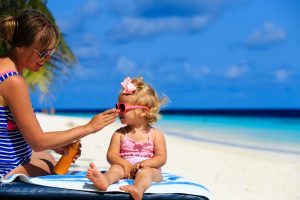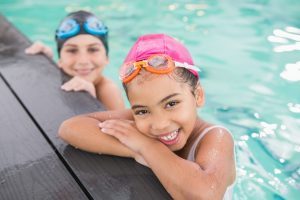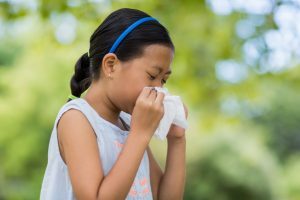Pediatric ear, nose and throat specialist Dr. Michael Cohen offers tips for parents to keep children safe this summer.
Grab your swimsuits and sunglasses — summer is in full swing!
With summer comes endless hours of outdoor activities for the kids, from swimming to bike rides to camping. While this may mean more opportunities for injuries and/or illnesses, there’s plenty you can do to keep your children safe while still letting them (and you!) enjoy the summer months.
We chatted with Dr. Michael Cohen, a pediatric ear, nose and throat specialist at Mass. Eye and Ear, who offered some summer safety tips to prevent multiple trips to the doctor’s office.
1) Stay Hydrated
 Time spent outdoors in the heat naturally dehydrates our bodies, and children may be too occupied in their activities to think about drinking water. Keep an eye on them throughout the day and help them to drink at least 5-8 cups per day, depending on their age and size.
Time spent outdoors in the heat naturally dehydrates our bodies, and children may be too occupied in their activities to think about drinking water. Keep an eye on them throughout the day and help them to drink at least 5-8 cups per day, depending on their age and size.
2) Beat the Heat
 Heat-related illnesses can be very dangerous. Infants and children younger than 4 are at the greatest risk, but children and adults of all ages can get sick from heat. If your child is experiencing symptoms of heat exhaustion (dizziness, nausea, fatigue, headache), seek medical help immediately.
Heat-related illnesses can be very dangerous. Infants and children younger than 4 are at the greatest risk, but children and adults of all ages can get sick from heat. If your child is experiencing symptoms of heat exhaustion (dizziness, nausea, fatigue, headache), seek medical help immediately.
The best defense against this is prevention. Make smart choices on hot days — limit sun exposure, dress your kids appropriately, cool them down with cold showers/baths and use air conditioning when possible.
3) Always Wear Sun Protection
 The importance of sunscreen can never be stressed enough. Apply sunscreen with SPF 30 or more to reduce the intensity of UV rays that can cause skin damage. Sunscreen should be applied 15 to 30 minutes before sun exposure and again every two hours—even on cloudy days! Have your children also wear sunglasses to protect their eyes from sun damage.
The importance of sunscreen can never be stressed enough. Apply sunscreen with SPF 30 or more to reduce the intensity of UV rays that can cause skin damage. Sunscreen should be applied 15 to 30 minutes before sun exposure and again every two hours—even on cloudy days! Have your children also wear sunglasses to protect their eyes from sun damage.
Note: Do not use sunscreen on children younger than six months. Newborns can be protected with hats, light clothing and sun avoidance.
4) Master Water Safety
 Having pool rules can save many accidents — such as staying away from the deep end and no running. When your kids are around water, always keep an eye on them. Encourage them to wear goggles to protect their eyes and have them use earplugs or swim caps to reduce their risk of swimmer’s ear. Swimmer’s ear is one of the most common causes for a doctors visit during the summer months, so make sure to dry your children’s ears completely after swimming (using a hair dryer on a cool setting also works!).
Having pool rules can save many accidents — such as staying away from the deep end and no running. When your kids are around water, always keep an eye on them. Encourage them to wear goggles to protect their eyes and have them use earplugs or swim caps to reduce their risk of swimmer’s ear. Swimmer’s ear is one of the most common causes for a doctors visit during the summer months, so make sure to dry your children’s ears completely after swimming (using a hair dryer on a cool setting also works!).
5) Avoid Summer Allergies
 Yes, allergies can happen in the summer. The biggest culprits: pollen and mold. The hot, humid summer air creates a perfect environment for both to grow and to creep into the air we breathe. Avoidance is the best way to combat summer allergies. Have your children stay inside on high pollen days (check this website for pollen counts, maintained by the American Academy of Allergy, Asthma and Immunology), keep your windows and doors closed, change your air-conditioner filters and have your children change their clothes when coming inside the house.
Yes, allergies can happen in the summer. The biggest culprits: pollen and mold. The hot, humid summer air creates a perfect environment for both to grow and to creep into the air we breathe. Avoidance is the best way to combat summer allergies. Have your children stay inside on high pollen days (check this website for pollen counts, maintained by the American Academy of Allergy, Asthma and Immunology), keep your windows and doors closed, change your air-conditioner filters and have your children change their clothes when coming inside the house.
6) Keep Insects Away
 Bugs can be a pesky part of summer. Bites from critters like mosquitoes and ticks can be irritating, and in some cases can lead to serious diseases like Zika or Lyme disease. Use effective insect repellent on your children when they are playing outside. After they have been outside, check their skin for ticks and/or bites. When in an area with a high volume of bugs, dress them in long sleeves, long pants, socks and shoes for increased protection.
Bugs can be a pesky part of summer. Bites from critters like mosquitoes and ticks can be irritating, and in some cases can lead to serious diseases like Zika or Lyme disease. Use effective insect repellent on your children when they are playing outside. After they have been outside, check their skin for ticks and/or bites. When in an area with a high volume of bugs, dress them in long sleeves, long pants, socks and shoes for increased protection.
7) Prevent Injuries on the Playground
 According to the Centers for Disease Control and Prevention, emergency departments in the US treat more than 200,000 children under the age of 14 for playground-related injuries each year. When going to the park, make sure play areas are safe and supervise your children. When they are out riding their bikes, they must always have a helmet on (one that is snug, fitted and level). It is also strongly encouraged to practice safety around fireworks. The best option is to leave firework use to professionals and never use them at home.
According to the Centers for Disease Control and Prevention, emergency departments in the US treat more than 200,000 children under the age of 14 for playground-related injuries each year. When going to the park, make sure play areas are safe and supervise your children. When they are out riding their bikes, they must always have a helmet on (one that is snug, fitted and level). It is also strongly encouraged to practice safety around fireworks. The best option is to leave firework use to professionals and never use them at home.
Overall, nothing protects your child better than you. Your vigilance, presence and extra eyes can help keep your children safe from harm this summer!



